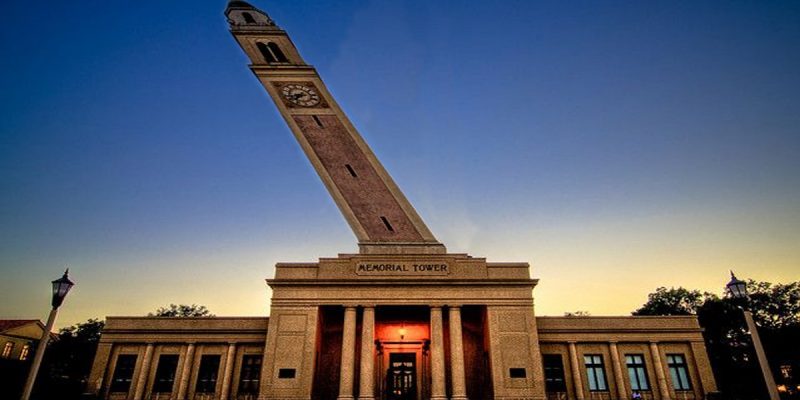Local media writers have begun speculating about the leadership void at LSU following the sudden departure of former President William Tate for Rutgers University. Both articles highlighted the faculty’s desire to play a pivotal role in the hiring process, the potential length of that process, and the possibility of splitting the current leadership role into two separate positions: Chancellor of the LSU Baton Rouge campus and President of the LSU system. They also floated names of possible candidates—ranging from current political figures to individuals within Louisiana’s higher education structure.
But the faculty’s political leanings—evident in their overwhelming support for Kamala Harris in the 2024 election—make their desire to steer the presidential search especially problematic. Federal election data show that most LSU faculty who made political contributions backed Harris or her supporting PACs—revealing a strong progressive bias. Yet LSU’s leadership must work hand-in-hand with state lawmakers, donors, and alumni—many of whom do not share the far-left ideology of the faculty.
Allowing faculty to dominate the search process risks installing a leader who aligns with their political preferences rather than one who can unify LSU’s many stakeholders. The Board of Supervisors should strongly consider limiting faculty involvement to an advisory role and instead prioritize the interests of the Louisiana public at large.
As Louisiana’s flagship university, LSU cannot afford to operate without a leader for long–especially amid pressing challenges. The simultaneous departures of key administrators, including General Counsel Winston DeCuir, Chief Administrative Officer Kimberly Lewis, and Provost Roy Haggerty, have compounded the leadership vacuum. A prolonged search could paralyze decision-making, delay responses to financial threats, and further weaken LSU’s national standing. The Board must act with urgency, streamlining the hiring process to install a new leader within a few months.
It’s also time to admit that the current dual-role model—combining LSU System President and Baton Rouge Chancellor into one position—is no longer sustainable. Splitting the role into two distinct offices would better reflect the system’s growing complexity and the unique challenges of managing the Baton Rouge campus, which serves nearly 40,000 students.
Under this model, the System President could focus on long-term strategy and system-wide governance, while a dedicated Chancellor could tackle the day-to-day operations and campus-specific issues of the Baton Rouge flagship. Dividing the roles would improve efficiency and effectiveness in both domains.

What’s clear is this: Louisiana’s current higher ed leadership is failing. According to the latest U.S. News & World Report rankings, only two public Louisiana universities—LSU at #197 and Louisiana Tech at #296—land in the top 300 nationally. Just two more crack the top 375. Several major public universities in Louisiana—such as McNeese State, Grambling State, and Northwestern State–don’t even make the top 400 in this ranking.
That’s right: only four public universities in Louisiana rank in the top 375 nationwide. These dismal numbers reflect deep-rooted systemic problems—ranging from low retention rates and poor ROI on degree programs to an overemphasis on DEI over merit and weak research output. Higher ed leaders have failed to elevate their institutions to national prominence—except in athletics.
With results like these, none of the current players in Louisiana’s higher education apparatus should be entrusted with running its flagship university. An external leader, unburdened by local systematic failures, is required to drive transformative change. That individual should have Louisiana roots, hold conservative values, and have no ties to DEI advocacy or initiatives.
The next LSU President must align ideologically with Louisiana’s values in order to lead effectively within our cultural and political context. Voters and legislators alike have made it clear: they favor traditional educational models and merit-based achievement—not “diversity, equity, and inclusion” bureaucracies.
DEI has no place in Louisiana, particularly after the resounding conservative mandate that the people of our state gave to the state legislature and the governor in the fall of 2023. Any leader with a track record of championing toxic DEI initiatives would immediately alienate state lawmakers and other key stakeholders, jeopardizing LSU’s ability to secure critical funding and political support. A leader free from DEI ideology would better serve the state and help refocus LSU on academic excellence.
LSU needs a new leader—and fast. The flagship is adrift. This moment demands urgent, decisive leadership. The selection process must be free from faculty’s political bias and focused on finding a bold, outside-the-system reformer who shares Louisiana’s conservative values. Let’s hope the Board of Supervisors makes the right call—for LSU’s future, and for the future of Louisiana higher education.
—
Nathan Koenig is a frequent contributor to RVIVR.com, a national conservative political site affiliated with The Hayride. Follow his writing on the Louisiana First Standard Substack, on Twitter (X) @LAFirstStandard, on Tik Tok @la.first.standard & on Instagram @lafirststandard. Email him here: louisianafirststandard@proton.me
Advertisement
Advertisement

